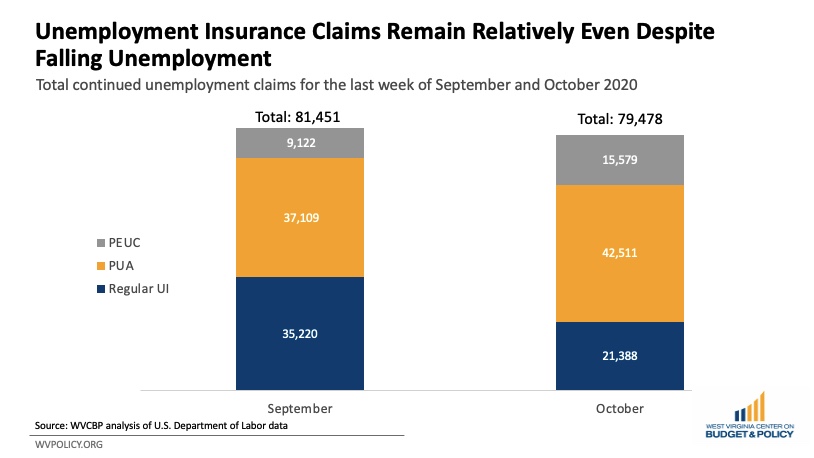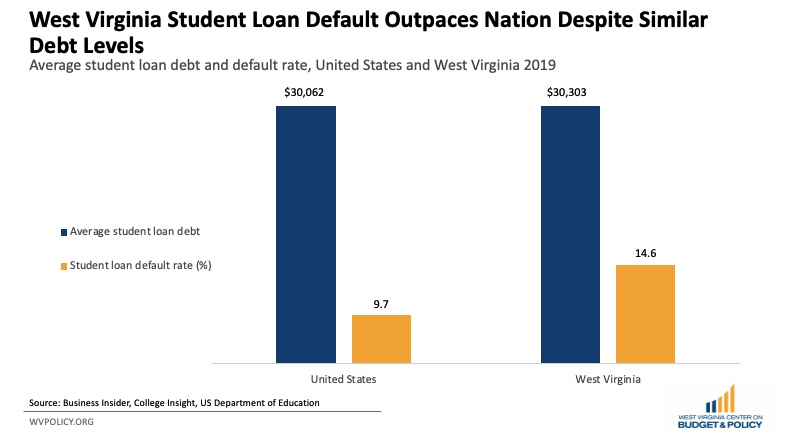In March, the federal government passed the Coronavirus Aid, Relief, and Economic Security (CARES) Act, which established several programs that have since proved critical for stabilizing the economy amid the COVID-19 pandemic. The CARES Act’s remaining provisions will expire on December 31, leaving Americans anxiously awaiting Congress’s next economic relief package. But with no precise congressional vision in sight, it is plausible that Americans will soon find it even more difficult to make ends meet as the federal government relief that has mitigated hardship over the past nine months comes to an end.
West Virginia, a high-poverty state, is particularly precarious as the end of the year swiftly approaches. While Americans across the nation would benefit from extended relief, residents of West Virginia and other states with elevated poverty levels are in particular need of aid. The remainder of this blog post dives into how three expiring CARES Act provisions have uniquely impacted West Virginia.
Losing enhanced federal unemployment benefits is one of the most significant ways that the expiring CARES Act will impact West Virginians. The CARES Act provided additional funds for individuals who lost their jobs during the ongoing pandemic through three programs. Pandemic Unemployment Compensation (PUC), the $600/week unemployment boost that expired at the end of July, was the most well-known of the three programs. However, two additional unemployment programs provided under the CARES Act, Pandemic Unemployment Assistance (PUA) and Pandemic Emergency Unemployment Compensation (PEUC), expire at the end of the year and are currently keeping the incomes of tens of thousands of West Virginians afloat.
PUA provides unemployment benefits for workers who are typically excluded from state unemployment benefits, including the self-employed, gig workers, and independent contractors. In the last week of October, over 42,500 West Virginians were claiming PUA benefits.
PEUC provides an additional 13 weeks of unemployment benefits to workers who have exhausted all their regular state unemployment benefits. West Virginia provides up to 26 weeks of state unemployment benefits. With job losses beginning in March and April, over 15,000 West Virginians are well into the additional 13 weeks of PEUC benefits.
While the unemployment rate decreased in October to 6.4 percent, other indicators suggest that the road to recovery is a long one. Between regular unemployment insurance (UI) claims, PUA, and PEUC, nearly 80,000 residents received unemployment insurance in the last week of October. These claims for the last week of October are about even with those in the last week of September, despite unemployment falling by over two percent during the same period.

While falling unemployment numbers are encouraging, steady unemployment insurance claims alongside increased SNAP and Medicaid enrollment during the same period highlights a need for continued assistance into the new year. If Congress does not act to extend the expiring unemployment programs, nearly 60,000 West Virginians depending on these two programs will see their incomes drop to zero on January 1.
Amended by the CARES Act, the Families First Coronavirus Response Act (FFCRA) also provides West Virginians with additional financial support through the end of 2020. Up to 270,000 workers in the state are estimated to be eligible for FFCRA, which offers up to two weeks of paid sick time for workers who need it to care for themselves or sick family members. In addition, the act allocates an additional ten weeks of paid time off for expanded family and medical leave. The provisions of FFCRA are available to most people who work for employers with fewer than 500 employees. Further, as a means of addressing health issues related to COVID-19, the paid leave categories included in FFCRA can also be used when a worker needs to take time off to care for a child whose school or child care provider is closed due to COVID-19.
Given that the United States has limited paid leave options for workers, the FFCRA has been necessary for keeping families afloat during this pandemic. Allowing its provisions to expire at the end of the year without any further aid will leave up to half of the state’s workforce vulnerable in the event of personal or family illness or emergency child care needs related to the pandemic.
The CARES Act also provides critical relief for West Virginians with federal student loans. Originally ending in September, the federal government extended the zero percent interest rates and suspension of monthly payments through the end of the year.
Two-thirds of 2019 West Virginia graduates borrowed federal loans to afford higher education. As of 2019, West Virginia residents collectively owe over six billion dollars in student loan debt, averaging about $30,300 per student. While the student loan average is on par with the rest of the nation, West Virginia maintains one of the highest default rates on student loans at 14.6 percent.

West Virginia has one of the highest poverty rates in the United States — helping to explain the elevated loan default rates — and the CARES Act has helped alleviate the financial strain that student loan debt has created. Extension of this federal student loan relief into 2021 would prove crucial for West Virginians with student loan debt, as well as their families and communities.
These are just a few of the significant ways that the expiration of the CARES Act will impact individuals across West Virginia. Other provisions ending on December 31 include federal mortgage forbearance, limited eviction bans, and no penalties for early retirement account withdrawal. Like unemployment insurance benefits, paid family leave, and student loan relief, each of these has been meaningful to West Virginians struggling due to the pandemic.
Congress should take immediate action to extend these provisions into 2021. Furthermore, the state government can mitigate some of the hardship its residents are experiencing by spending the rest of the available CARES Act funds, which will also expire on December 31 and must be returned to the federal government if unused. Both the federal and state governments must take meaningful action before the end of the year to ensure that their respective constituents’ physical and financial health is prioritized.